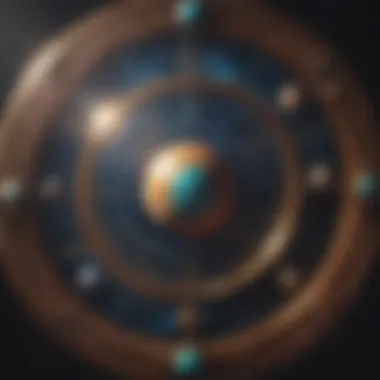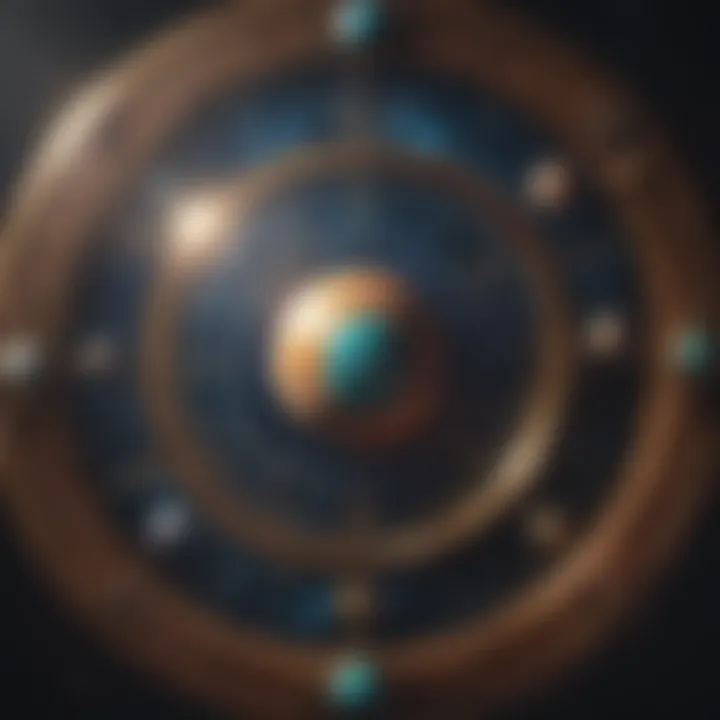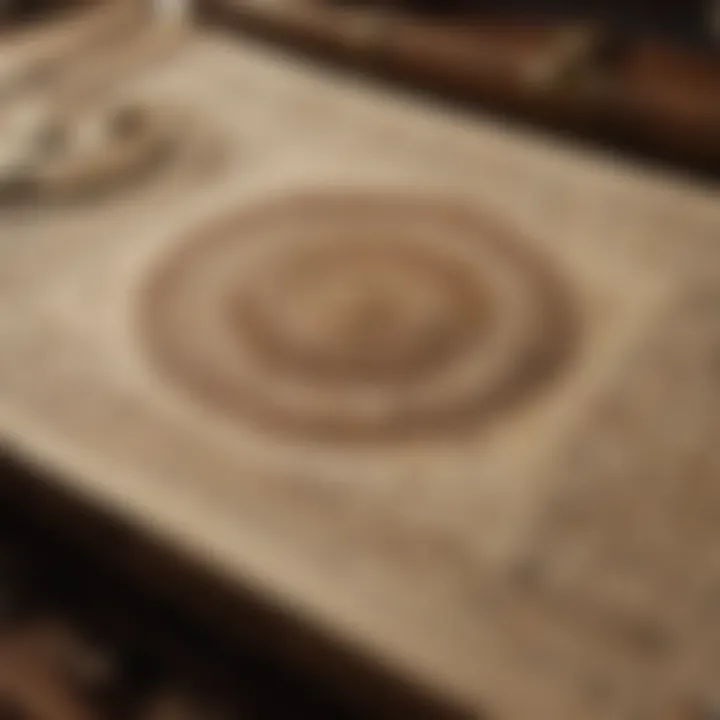Exploring Horoscopes: A Detailed Insight into Astrology


Intro
The vast expanse of the cosmos has intrigued humanity for millennia. One way people try to comprehend the complexities of life is through the lens of horoscopes. This article takes readers on an in-depth exploration into horoscopes, shedding light not just on their significance in our daily lives but also on the intricate workings behind the astrological concepts. By understanding these elements, practitioners—be they astrologers, tarologists, or esotericists—can develop a robust interpretation of the cosmic forces at play.
Astrological Concepts
Definition of Key Terms
Before diving deeper, it helps to familiarize ourselves with some essential terminology in astrology. For instance, horoscope often refers to a chart representing the positions of the sun, moon, and planets at a particular time—usually linked to an individual's birth. It paves the way for analyzing personality traits and potential life paths. Similarly, natal chart is personalized and serves as a roadmap of the individual’s celestial influences at the moment of their birth. Understanding these nuances sets the groundwork for further discussions.
Historical Background of Astrology
Astrology is a tapestry woven through history, bridging various cultures and philosophies. The practice can be traced back to ancient civilizations such as the Babylonians and Egyptians, who meticulously recorded celestial events. Many believe astrology served not only as a source of guidance but a method of predicting agricultural cycles and celestial phenomena that affected their daily lives. With time, different cultures have adapted these ancient practices, creating a rich history that stands testament to humanity’s quest for knowledge and meaning.
Overview of Different Astrology Branches
The world of astrology is multifaceted, encompassing various branches, each with its own focus. Some of the notable ones include:
- Natal Astrology: Examining an individual's birth chart to glean insights about their inherent traits and potential future.
- Mundane Astrology: Concentrating on world events and the collective fate of nations.
- Horary Astrology: A method of answering specific questions by analyzing the positions of celestial bodies at the time the question is asked.
Each branch signifies different dimensions of astrological influence, catering to the vast array of human experiences.
Zodiac Signs Exploration
In-Depth Analysis of Each Sign
The twelve zodiac signs form the backbone of astrological interpretation. Starting from Aries, known for its fiery passion, to Pisces, which embodies emotional depth, each sign brings unique flavors into the cosmic kettle. For instance, Gemini with its dual nature often showcases adaptability, while Virgo is recognized for its meticulousness and attention to detail. Analyzing each sign reveals common patterns and behaviors that help shape personal identity.
Personality Traits and Characteristics
Delving deeper into personality, each sign carries distinct traits:
- Aries: Assertive and enthusiastic, loves a challenge.
- Taurus: Reliable and practical, values stability and comfort.
- Gemini: Communicative and curious, thrives in social situations.
- Cancer: Intuitive and sensitive, prioritize family and home life.
- Leo: Charismatic and self-assured, enjoys being in the spotlight.
- Virgo: Analytical and organized, driven by a desire for perfection.
- Libra: Diplomatic and charmful, seeks harmony and balance.
- Scorpio: Determined and passionate, often viewed as mysterious.
- Sagittarius: Adventurous and open-minded, loves freedom and exploration.
- Capricorn: Disciplined and ambitious, set high standards for themselves.
- Aquarius: Innovative and unconventional, values independence.
- Pisces: Compassionate and empathetic, often drawn to the arts.
Historical and Mythological Connections
Each zodiac sign often ties back to mythological tales. For instance, Sagittarius is linked to the centaur, a symbol of half-man, half-horse famed for its pursuit of knowledge. Such stories not only enrich the identity of the signs but also create a sense of continuity and acknowledgment of life's lessons passed down through generations.
Celestial Events
Major Cosmic Phenomena
Celestial events such as eclipses, planetary retrogrades, and alignments are not merely astronomical occurrences; they hold significant astrological implications. Eclipses, often seen as harbingers of change, can signal transformations in personal and communal aspects. Similarly, when planets retrograde, they often prompt introspection and reevaluation, urging individuals to slow down and reassess their paths.
Impact of Celestial Events on Astrology
The movements of celestial bodies exert immense influence over astrological interpretations. For example, during a lunar eclipse, old patterns may come to light, prompting individuals to release what no longer serves them. Recognizing these rhythms helps deepen the understanding of one's personal horoscope, enhancing its practical application.
Rituals and Practices During Celestial Events
Many astrologers and enthusiasts partake in specific rituals during significant celestial events. It could range from journaling their feelings or intentions during a new moon to meditative practices at the time of an eclipse. Engaging with these cosmic moments creates space for growth, alignment, and deeper connection with oneself and the universe.
"Astrology is a language. If you understand this language, the sky speaks to you." - Dane Rudhyar
Understanding the Core Concepts of Astrology
Astrology is not just about zodiac signs and daily horoscopes; it revolves around a complex interplay of celestial bodies and their corresponding influences on human life. Understanding these core concepts forms the bedrock of astrological practice, lending clarity and depth to all subsequent explorations of horoscopes. This foundation enables practitioners, whether seasoned or novice, to align their interpretations with a broader cosmic narrative.
Definitions and Key Terminology
To navigate the astrological landscape, one must get familiar with key terminologies that constitute its language. For instance, terms like natal chart, aspects, and houses carry significant weight in astrological discussions.
- Natal Chart: This is a snapshot of the sky at the exact moment and location of one’s birth. It serves as a blueprint of the individual’s potential, marking the placements of the planets across various zodiac signs and houses.
- Aspects: These refer to the angles formed between planets in relation to one another. Aspects are crucial because they describe the interactions between celestial bodies, implying harmony or discord in an individual's life. Common aspects include conjunctions, squares, and trines.
- Houses: The natal chart is divided into twelve houses, each representing different facets of life—career, relationships, home, and more. The specific house a planet resides in can significantly influence how its energy is expressed in a person's life.
Gain a solid grasp on such terms to successfully interpret horoscopes. It’s analogous to a music lover learning about musical notes before diving into playing an instrument; understanding the vocabulary enriches one’s ability to appreciate and utilize astrological insights.
The Role of Celestial Bodies
Stars and planets aren't merely distant points of light in the sky; in astrology, they play pivotal roles in shaping human destiny. Each celestial body symbolizes distinct energies, traits, and influences. For example, Venus is often associated with love and beauty, while Mars embodies assertiveness and action.
The following celestial bodies are particularly significant:
- The Sun: Represents the self, ego, and personal identity. It’s the core of one's personality.
- The Moon: Symbolizes emotions, intuition, and the subconscious. It can indicate how we respond to changes in our environment.
- Mercury: Governs communication, intellect, and reasoning. How one processes information is largely reflected by Mercury's position.
- Saturn: Often seen as a teacher, it instills discipline, responsibility, and boundaries. Its influence can lead to life lessons, often through challenges.
Moreover, the movements of these celestial bodies through the zodiac signs and houses dictate the unfolding of astrological events, influencing individuals in nuanced ways. Astrologers interpret their positions, examining how they relate to one's natal chart, to provide insights into current life situations.


"Understanding the dynamics of celestial bodies allows one to decode the cosmic messages that accompany horoscopes, providing clarity in an often chaotic world."
As we reflect on these essential elements—definitions, terminology, and celestial roles—we prepare for deeper dives into the rich tapestry of horoscopes and their practical applications in our lives.
The Historical Evolution of Horoscopes
The realm of horoscopes is deeply rooted in history, reflecting the beliefs, traditions, and cultural practices of civilizations over the ages. Understanding the historical evolution of horoscopes is not just a stroll down memory lane but a vital key to unlocking the complexities of modern astrology. By examining how horoscopes were perceived and utilized throughout distinct historical periods, we gain insights into the foundations of astrological thought and its relevance today. This journey allows us to decipher ancient wisdom and appreciate its interpretations in our contemporary lives.
Astrology in Ancient Civilizations
In ancient civilizations, astrology and horoscopes were revered with a blend of fascination and fear. The Sumerians are some of the earliest practitioners; they meticulously recorded celestial events around 3,000 BC. They believed that the movements of the stars had direct correlations with the earthly realm. This early astrology was not merely about myth; it entwined with agricultural practices and social structure. The Egyptians followed suit, crafting elaborate astrological charts to align their rulers with cosmic favor.
Here's a list of ancient cultures and their unique contributions:
- Babylonian Astrology: They were pioneers in creating early horoscopes, focusing on the position of planets and zodiac signs to predict personal destinies.
- Chinese Astrology: This practice focused on the lunar calendar and the Twelve Earthly Branches, creating a system distinctly separate from Western traditions.
- Hellenistic Astrology: By blending Babylonian and Egyptian techniques, the Greeks built a framework that still underpins much of modern astrology, introducing concepts like houses and aspects.
Astrology in these times was often intertwined with religion and governance. Kings and queens consulted astrologers for guidance on matters of state and health, reflecting a profound belief that the universe was interconnected. The historical artifacts from these eras—like stone tablets and manuscripts—reveal the enduring significance of the stars in shaping human destiny.
From Medieval to Modern Times
The transition from medieval to modern interpretation of horoscopes exemplifies the resilience and adaptability of astrological practices. During the medieval era, astrology was considered a legitimate science, closely tied to alchemy and the study of natural philosophy. Astrologers served as important figures in courts, advising on everything from warfare to harvests. However, with the rise of the Enlightenment in the 17th century, a seismic shift occurred.
Skepticism began to take hold, leading to astrology's relegation to the fringes of society. Yet, even as some dismissed it, the fascination with horoscopes never fully disappeared. The 20th century marked a renaissance for astrology, particularly with the advent of psychological astrology, pioneered by figures like Carl Jung. This approach positioned astrology as a tool for self-exploration rather than mere prediction.
Key elements of the movement included:
- Reinterpretation of astrological signs in the context of personality and behavior.
- The rise of popular astrology through magazines and newspapers, making horoscopes accessible to the general public.
- The integration of astrological insights in psychology and therapy.
Today, astrology continues to thrive, especially among younger generations, as personal and collective identities evolve within the cosmic framework. Horoscopes remain, both as a practical tool for daily life and a connection to ancient wisdom, blending science, philosophy, and spirituality into a cohesive narrative.
"Astrology is a language. If you understand this language, the sky speaks to you." - Dane Rudhyar
The historical evolution of horoscopes reveals the intricate tapestry of human belief, curiosity, and exploration of the cosmic dance. Each period contributes to our understanding today, making the study of horoscopes not just an activity but a journey through time.
How to Read a Horoscope
Understanding how to read a horoscope is a pivotal skill for anyone interested in astrology. It’s not just about knowing your sun sign; it's about delving deeper into the intricate details that the stars and planets dictate. A horoscope can provide guidance, insights, and reflections on one's life journey, illuminating personal strengths and challenges.
A shrewd interpretation of horoscopes involves recognizing patterns and symbols that shape our experiences. By learning this art, you not only get important revelations about yourself but also enhance your capacity for making wise decisions.
Aspects such as zodiac signs, houses, and astrological symbols will be key components in the learning process, each bearing its own significance. Taking the time to grasp these elements can lead to enhanced clarity on various personal issues.
"Astrology is a language. If you understand this language, the sky speaks to you." - Dane Rudhyar
Understanding Zodiac Signs
Zodiac signs are perhaps the most well-known aspect of astrology. Each sign, spanning across twelve distinct divisions, reflects specific traits and characteristics. For instance, Aries typically embodies leadership and enthusiasm, while Pisces is often more intuitive and creative.
When reading a horoscope, knowing one's sun sign is merely the starting point. Everyone's personality is multifaceted and requires consideration of other aspects in the chart like the moon sign and rising sign. It’s like having a tapestry woven from many threads; each sign contributes to the full picture of one's character.
A major benefit of understanding your zodiac sign can be seen in interpersonal relations. Knowing your own traits as well as those of others can foster empathy, thereby enhancing communication and understanding between individuals.
The Importance of Houses and Aspects
The astrological chart is divided into twelve houses, each representing different life areas such as relationships, career, and personal growth. When interpreting a horoscope, it’s vital to consider how planets are placed in these houses.
The aspects between planets—how they interact with one another—also play an essential role. For example, a harmonious trine between Venus and Jupiter may suggest a period of good fortune in love or finances. Conversely, a square between Saturn and the Moon could indicate emotional challenges.
Learning about houses and aspects helps readers discern not only their strengths but also areas needing improvement. It’s less about predicting the future and more about understanding the underlying forces at play.
Translating Astrological Symbols
Astrological symbols can often look like they belong in an art gallery rather than a self-help manual. However, learning how to interpret these symbols is central to mastering horoscope reading. Each planet, zodiac sign, and aspect has its own unique representation.
For example, the symbol for Venus resembles a hand mirror, reflecting its essence of love and beauty. Likewise, the moon symbol consists of a crescent, echoing intuition and emotions. Breaking these patterns down into manageable parts can demystify the process and make it much less intimidating.
Furthermore, context matters when translating these symbols. For instance, if Venus appears in a challenging aspect, the reading should keenly gauge the implications rather than simply defaulting to its general meanings. In essence, it’s about painting a more detailed picture rather than viewing it through a narrow lens.
In summary, deciphering horoscopes requires a blend of knowledge, intuition, and context. By mastering the art of reading zodiac signs, understanding houses, and translating symbols, individuals can unlock profound insights—not just about themselves, but about the universe they live in.
Practical Applications of Horoscopes
Horoscopes aren’t just for passing time or sparking conversations at social gatherings. They hold the potential for significant personal insight and guidance. Understanding the practical applications of horoscopes can enhance one's life by providing clarity and perspective during various circumstances. The notion that celestial patterns influence personal experiences and behaviors resonates with many. This section will delve into how horoscopes can become tools for growth and informed decision-making in every facet of life.
Utilizing Horoscopes for Personal Insight
Tapping into horoscopes contributes to self-discovery. People often look to horoscopes not just for future predictions but to understand who they are at their core. For instance, by examining the position of their sun sign in a horoscope, individuals may uncover innate strengths and weaknesses. This can serve as a reflective mirror, highlighting personal traits that may go unnoticed in the hustle and bustle of life.


Consider the fiery nature of a Leo. Knowing this, a Leo may realize their tendency towards leadership and creativity but might also acknowledge their struggle with stubbornness or pride. Such awareness can foster better relationships. The recognition of one’s characteristics can lead to better communication with others, ultimately guiding them towards more fulfilling interactions.
Another way to harness horoscopes is through journaling the transits and daily predictions. This practice not only aids memory but helps identify recurring themes in one’s personal development. By tracking these patterns, individuals can start querying deeper questions: Why do certain moods align with the lunar cycle? Which planetary shifts correlate with career advancements? Essentially, horoscopes can become saved maps, charting emotional and life transitions.
Astrology in Everyday Decision-Making
Astrology provides an engaging framework for making everyday choices. When faced with dilemmas—be it in career, relationships, or health—horoscopes offer alternative perspectives. They can inform decisions about moving forward, whether that’s accepting a job offer under a favorable Mercury transit or reconsidering a relationship during a Venus retrograde.
By listening to astrological guidance, one might gain confidence in their choices. If you read that Jupiter is in your tenth house, it could be an opportune time to pursue that role you've been eyeing. Similarly, acknowledging a Saturn return might prompt caution in spending, reminding you to be more prudent.
Moreover, astrology aids in understanding the dynamics of relationships. If you know your friend has a Scorpio moon while yours is in Gemini, this knowledge can foster empathy during heated discussions. Understanding your own and others' astrological influences allows for better navigational skills in social waters.
To pare it down, here are some practical ways to utilize astrology in daily life:
- Plan significant activities: Use favorable lunar phases for starting new projects.
- Timing: Consider personal transits when making crucial decisions, like moving or changing jobs.
- Self-care: Nurture yourself based on what aspects are influencing your natal chart.
Ultimately, engaging with horoscopes as tools for personal insight and decision-making encourages a deeper connection to oneself and one’s surroundings. By integrating this cosmic wisdom into everyday life, individuals could find themselves making more thoughtful, reflective choices.
The Influence of Planetary Movements
Understanding how planetary movements affect us is an integral part of astrology. This topic is significant because it directly influences not just personal horoscopes, but also societal trends and cycles that can be observed globally. Whether it’s the shifting emotions during a retrograde or the significant insights gained from eclipses, these celestial events shape our experiences and decisions.
Understanding Retrogrades and Eclipses
Retrogrades are fascinating phenomena in astrology, typically associated with communication mishaps and technological snafus. When a planet appears to move backward in the sky, which is an optical illusion, it's entering a phase that calls for introspection rather than action. For instance, during Mercury retrograde, many folks find themselves retracing steps, reevaluating their choices, and often revisiting unfinished business. This is a prime time for self-reflection.
Eclipses, on the other hand, bring about significant changes. Often occurring in pairs, they represent a climax or turning point. A solar eclipse can bring new beginnings, while a lunar eclipse may deliver closure. People born during eclipse periods are frequently noted for their adaptability and transformative power. To make the most of these sublime events, one should consider:
- Keeping a journal during these phases to track personal shifts.
- Engaging in meditation or contemplative practices, particularly on the day of an eclipse.
- Avoiding major decisions, especially during Mercury retrograde, as clarity might be clouded.
The Effects of Transits on Personal Life
Transits refer to the ongoing movement of planets in relation to the natal chart. These movements can trigger various life events or emotional shifts, often revealing deeper personal truths. For instance, when Saturn moves across your natal Sun, it can influence feelings of restriction, leading to hard work and perseverance. Understanding these transits provides insight into periods of growth or struggle.
Consider these points when analyzing transits:
- Each planet has its own set of effects; for instance, Jupiter usually brings expansion and luck, while Mars ramps up energy but can also cause conflict.
- Pay attention to the timing – knowing when a particular transit is active allows you to prepare for its influences.
- Reflect on your personal development during these periods; they are often pivotal in your life journey.
"Astrology is a science of Cosmos that revolves around understanding one’s deeper self. Each movement in the sky is a nudge toward exploring your internal landscape."
In summary, the movements of celestial bodies like retrogrades and transits are pivotal in shaping our emotional and physical experiences. By actively engaging with these astrological phenomena, one can not only navigate life's ups and downs but also cultivate a greater understanding of oneself in the tapestry of the universe.
Compatibility and Relationships through Astrology
Astrology has always provided a lens through which one can explore the intricate dynamics of human relationships. Compatibility and relationships through astrology reveal not just the potential harmony or disharmony between individuals but also the unique traits and energies each person brings to the table. This is particularly significant for those who seek deeper understanding in their romantic connections or friendships and want to navigate the complexities of human interaction with greater clarity.
Analyzing Astrological Compatibility
Astrological compatibility often hinges on the examination of the zodiac signs involved. At the base of this compatibility assessment is the concept that each sign has distinct qualities and elemental associations. For instance, Fire signs (like Aries, Leo, and Sagittarius) are known for their passionate and dynamic nature, while Earth signs (Taurus, Virgo, Capricorn) are often more grounded and practical. When assessing compatibility, it’s advantageous to look at the element of each sign:
- Elements: Fire, Earth, Air, and Water. They each interact differently, with Fire and Air tending to stimulate each other positively, whereas Fire and Water can create conflict.
- Modalities: Cardinal, Fixed, and Mutable modalities indicate how dynamic or stable each sign might be in a relationship.
- Zodiac Traits: Certain signs like Libra and Gemini may naturally mesh well due to their shared Air element, while others, like Scorpio and Leo, may face challenges owing to their contrasting styles.
These factors combined create a framework for evaluating compatibility levels, but they shouldn't be the only parameters used for analysis.
The Role of Synastry in Relationships
Synastry dives deeper into individual birth charts to understand relationship dynamics profoundly. This method goes beyond examining just sun signs; it involves comparing the entire chart—including the positions of the moons and planets at the time of each person's birth. By doing so, astrological practitioners uncover powerful aspects such as:
- Planetary Aspects: The angles formed between planets in the two charts can indicate strengths and potential areas of conflict. For example, a trine can suggest ease and harmony, while a square often points to challenges.
- Houses: The placement of planets in respective houses reveals how partners are likely to influence each other’s lives, where they might complement, or where friction could arise.
- Personal Vitality: Understanding how one partner’s emotional needs (Moon sign), self-expression (Sun sign), and life energies (Ascendant) align or clash with the other’s can guide in effectively addressing concerns.
Astrology is not merely about predicting events; it is a valuable guide for understanding relationship dynamics and personalities, paving the way for greater empathy and communication.
By comprehensively addressing both sun sign compatibility and, more intricately, synastry, individuals tap into a tool that can inform their relationship choices, fostering deeper connections or guiding them away from potentially tumultuous partnerships.
The Psychological Perspective of Astrology
Astrology isn't merely about celestial bodies and zodiac signs; it serves as a significant psychological tool for self-exploration and understanding. This perspective brings to light the profound ways that astrological insights can aid individuals in navigating emotional complexities and life challenges. By examining one’s astrological chart, one may find a unique mirror reflecting their inner workings, motivations, and connections to the universe. In this section, we delve deeper into how astrology acts as a tool for self-reflection and coping mechanisms rooted in astrological interpretations.
Astrology as a Tool for Self-Reflection
When individuals turn to astrology, they often seek clarity. Their birth chart, which captures the positions of celestial bodies at one’s time of birth, can unveil key themes in their personality. This process of self-discovery can help people identify personal strengths and weaknesses. It creates an avenue for one to ask - "Why do I behave this way?" or "What triggers my emotional responses?"
Astrology provides a language to articulate feelings and experiences that may otherwise feel overwhelming or confusing. For instance, someone with a strong influence of Mars might find themselves driven, competitive, yet insatiably restless. Recognizing these traits enables individuals to work consciously towards harnessing their energy productively.
Moreover, the houses in one’s chart can point towards various domains of life, offering a comprehensive understanding of where challenges might arise. By analyzing how different planetary placements affect personal areas, one may address issues head-on, allowing for conscious growth. By connecting the dots between cosmic events and personal experiences, astrology fosters an environment for introspection.
"Understanding oneself is the first step toward inner peace and acceptance.”


Coping Strategies Using Astrological Insights
Astrological insights can empower individuals during turbulent times. By mapping celestial transits and recognizing their potential impact, people may anticipate emotional shifts and adjust their reactions accordingly. For example, during a Mercury retrograde, communication issues often arise. Knowing that this period is marked by potential misunderstandings allows individuals to practice patience and mindfulness in their interactions.
In addition, individuals can adopt certain coping strategies based on their astrological profiles. Below are some tailored strategies:
- For Water Signs: Engage in creative outlets or journaling as a means to express emotions.
- For Fire Signs: Consider physical activities such as running or team sports to channel excess energy positively.
- For Earth Signs: Utilize grounding techniques like meditation in nature, allowing them to reconnect with their core stability.
- For Air Signs: Participate in stimulating conversations or group discussions to enhance mental clarity and social connectivity.
By aligning coping methods with one’s astrological traits, individuals can better navigate their emotions and circumstances. In essence, utilizing the language of astrology for personal integration can transform one’s approach to life's ups and downs. It fosters resilience and enhances an individual’s capacity to face challenges with an informed mindset.
Addressing Skepticism and Criticism
When delving into the realm of horoscopes, one cannot ignore the ample skepticism that surrounds astrology. This is crucial because understanding and addressing such criticisms allows both practitioners and enthusiasts to articulate their beliefs more clearly and formulate a more robust understanding within the wider context of personal insight. The overall focus should be on fostering an informed dialogue that can bridge the gap between the scientific community and those who find value in astrology.
Among the myriad of criticisms leveled against astrology, one of the most prominent is the idea that it lacks empirical evidence to support its claims. Critics often point out that astrology does not adhere to the tenets of the scientific method, which emphasizes hypothesis testing and observable evidence. Furthermore, there are those who argue that the apparent correlations between celestial alignments and human behavior could merely be coincidences rather than definitive causations.
Nevertheless, addressing these misconceptions can be beneficial. By highlighting how astrology can provide personal insights and guide decision-making processes, practitioners can defend astrology as a meaningful practice rather than a mere pseudoscience. This perspective encourages a nuanced understanding rather than an outright dismissal of its value in people's lives.
Common Misconceptions About Astrology
The misunderstandings about astrology are many. It is often mistakenly viewed simply as a form of fortune-telling, reduced to vague predictions that have little basis in reality. However, this reductionist view ignores the depth of astrological science, which has intricate systems guiding its interpretations. An astrological chart isn’t just about the sun sign you identify with; it's a complex interplay of various factors including moon signs, rising signs, houses, and aspects among the celestial bodies.
Some common misconceptions include:
- All astrologers predict the future identically: There is no one-size-fits-all methodology. Each astrologer has a unique style and interpretational framework.
- Astrology is only for the gullible: In reality, many logical, critical thinking individuals find depth and value in astrological insights.
- Zodiac signs dictate fate directly: Instead, astrology serves as a guide. It reflects potentials rather than preordained outcomes.
Counterarguments from Astrological Practitioners
Astrological practitioners often counter the skepticism with compelling arguments that underscore the spiritual and psychological significance of astrology. They argue that while astrology may not fit neatly within conventional scientific boundaries, its utility lies in its ability to resonate on a personal level.
Practitioners explain that astrology offers a symbolic language of the cosmos, which can be a mirror for self-reflection and personal growth. Here are some frequent points argued by practitioners:
- Astrology aids in self-discovery: The insights gained through horoscopes can lead to profound self-awareness and personal development.
- Empirical observations from history: Throughout human history, astrology has been associated with great thinkers, such as Ptolemy and Kepler, whose works reflect the seriousness with which astrology was regarded.
- Cultural relevance: Astrology often reflects collective concerns and societal trends, providing valuable insights into the human experience across different cultures and times.
In summary, addressing skepticism is pivotal for those engaged in astrology. By clarifying misconceptions and articulating well-informed counterarguments, astrology can be recognized for its potential to enhance understanding and personal insight. Acknowledging the criticisms while providing thoughtful responses allows a greater dialogue about the role astrology could play in a reflective individual’s life.
The Future of Horoscope Interpretation
As we chart a course into the future, the realm of horoscopes appears ripe for evolution and adaptation. The interplay of technology and spirituality presents a fascinating landscape for astrologers and enthusiasts alike. Understanding where we are headed in horoscope interpretation reveals not only the growing relevance of astrology in contemporary life but also catalyzes dialogue about its potential benefits and limitations.
In this section, we dive deep into technological advancements shaping astrology, the infusion of fresh perspectives from younger generations, and how these changes pave the way for a more substantial individual connection with celestial patterns.
Technological Advancements in Astrology
With the rise of digital technology, astrology has become more accessible than ever, allowing a new wave of practitioners to engage with horoscopic traditions. Applications and websites are now providing personalized readings based on intricate algorithms, which simulate the complex calculations traditionally performed by astrologers.
- Astrological mobile apps such as Co-Star and The Pattern offer real-time readings based on the user’s birth chart.
- Data analytics and machine learning are refining predictions and personalizing user experiences, generating unique insights tailored to individual users.
- Social media platforms present another layer, enabling information sharing, live discussions, and community-building among astrology enthusiasts, often leading to grassroots movements.
"Technology is not just a tool; it has become a catalyst for new narratives in astrology, where we can combine ancient wisdom with modern knowledge."
These advancements allow for a democratization of astrology, where individuals who may never have engaged with it in traditional settings can now explore its depths from their smartphones or laptops. However, this reliance on technology raises questions about the authenticity of zodiac interpretations and the potential oversimplification of nuanced astrological insights.
The Growing Popularity of Astrology Among Millennials and Gen Z
The esoteric arts have seen a renaissance among younger generations, particularly Millennials and Gen Z. This demographic shift is noteworthy, as it showcases a thirst for meaning and connection that many feel is lacking in contemporary society. Several factors contribute to this uptick in interest:
- Desire for Self-Discovery: Young individuals are increasingly turning to astrology for self-exploration, guiding them through personal questions about identity, relationships, and purpose.
- Cultural Commentary: Astrology has also become a means of navigating the complexities of modern life. Memes and social media share humor in astrological signs, solidifying its place in popular culture, which makes it more appealing.
- Community Engagement: Online forums and platforms like Reddit help facilitate discussions about astrological trends and personal stories, creating avenues for shared experiences and learning.
Furthermore, the understanding of astrology as an inclusive practice that embraces diverse perspectives resonates with these generations.
As astrology continues to evolve, so too does its interpretation and relevance. Keeping an eye on these trends feels essential for both practitioners and skeptics, as engagement with horoscopes likely will persist and possibly flourish in an increasingly interconnected world.
Culmination: Integrating Astrology into Daily Life
Integrating astrology into daily life is not just about peeking at your horoscope every morning. It embodies embracing a mindset that allows celestial occurrences to guide personal development, decision-making, and self-reflection. Many people view astrology as whimsical, yet when approached thoughtfully, it offers genuine insights into personal behavior and life choices. The significance of horoscopes lies in their potential to serve as both a mirror and a compass. As we peel back layers of this discipline, it reveals patterns that help us navigate relationships, career paths, and emotional landscapes.
Astrology encourages individuals to be introspective, fostering a deeper understanding of themselves. Instead of viewing life's challenges as random twists of fate, astrology provides a framework to identify periods of struggle or joy. This enhanced awareness can fuel personal growth and resilience, making astrology not just a pastime but an integral part of one’s daily thought process.
Practical Tips for Daily Horoscope Engagement
To make astrology a functional part of your daily routine, consider implementing the following practical tips:
- Set a Routine: Dedicate a specific time each day to read your horoscope. Whether it's with your morning coffee or during a break at work, a consistent ritual reinforces the habit and allows you to engage with the material meaningfully.
- Keep a Journal: Document your experiences and reactions related to your daily horoscopes. Over time, this becomes a powerful tool to recognize how astrological predictions and real-life events coincide.
- Connect with Others: Join forums or social media groups focused on astrology. Engaging with a community, like those on reddit.com, creates a shared space for discussion and learning.
- Explore Different Perspectives: Don’t limit yourself to one source or style of astrology. Investigate various astrological traditions—like Vedic, Western, or Chinese astrology—to expand your understanding of how celestial influences work.
Embracing Astrology as a Living Practice
Astrology is more than merely observing the stars; it can become a living practice that shapes one’s identity and choices. To embrace this practice, one needs to recognize that it is not static but rather a dynamic relationship with the universe. Here are some ways to cultivate a more profound astrological practice:
- Personalize Your Interpretation: Learn your natal chart and tailor your horoscopes to your unique placements. Understanding your sun, moon, and rising signs can provide deeper insights into your horoscope's relevance.
- Reconnect with Nature: Take time to observe the night sky. Finding constellations and tracking planetary movements can foster a more personal connection with astrology.
- Mindfulness and Reflection: Incorporate mindfulness techniques while reflecting on your astrological insights. Meditation, for instance, can help align your thoughts with astrological guidance, allowing for a more meaningful engagement with your horoscope.
- Stay Open-Minded: Be willing to explore how astrological insights may help you shape your life outlook, relationships, and interactions. Your openness can turn astrological events into opportunities for growth.
"Astrology is a story written in the stars—what role do you play?"
By weaving these practices into your everyday life, astrology transforms from a mere predictive tool to a vibrant part of your identity. It becomes a continuous exploration of who you are and who you are becoming, driven by the rhythms of the cosmos.







